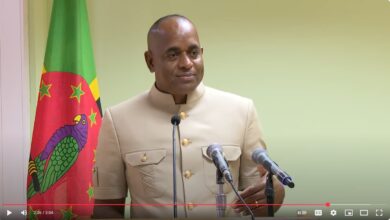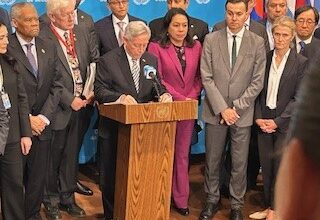(CARICOM Secretariat, Turkeyen, Greater Georgetown, Guyana) The recovery efforts in Haiti was definitely a priority item on the agenda of the 31st Regular Meeting of the Conference of Heads of Government of the Caribbean Community when they got down to dealing with the business of the Community at the Rose Hall Resorts and Spa in Montego Bay, Jamaica.
With the Conference now in its third and final day of deliberations, CARICOM Heads of Government agreed to facilitate the movement of Haitian business persons within the Community and to endorse the recent decision of trade ministers to permit Haiti to commence the unilateral trade in goods in a range of products. Meanwhile, in a separate meeting, the Managing Director of the International Monetary Fund (IMF) Dominique Strauss-Kahn, told CARICOM Heads of Government that his institution would speed up the regulatory and bureaucratic arrangements now in train to make it possible for Haiti to be granted debt forgiveness in light of that country’s experience with a natural disaster of mammoth proportions.
Haiti was getting ready to begin operations within the framework of the CSME by commencing the Trade in Goods component when the catastrophic January 12 earthquake struck, thus frustrating the January time-table for Haiti’s big step into the CSME.
The Special Representative of the CARICOM Heads of Government on Haiti, the Most Honourable P. J. Patterson gave the Conference a detailed overview of the various forms of assistance provided by the Community to Haiti since January 12. This included emergency relief and solidarity; the contribution of financial and other resources and institutional assistance.
The discussion, which also included both secretaries-general from the United Nations and the Organisation of American States, spawned a decision to provide technical assistance to offset Haiti’s depleted institutional capacity.
The Conference also agreed to contribute to the recovery and development processes through direct action and the encouragement of the involvement of the Private Sector, including the Diaspora and other actors, in sectors such as housing, construction, education and agriculture.
Notwithstanding the positives, all was not seemingly well in every aspect of the reconstruction efforts, and Heads of Government seized the opportunity of having two secretaries-general present to express grave concerns over the slow rate of disbursement of donor pledges, the shortfall in budgetary support for the Government of Haiti and the uncoordinated role of non-governmental organizations in the recovery and reconstruction process.
During the opening ceremony on 4 July, representatives of the major sectors that provided emergency relief to Haiti – emergency response, emergency health and security and logistics – were presented with Scrolls of Commendation for their selfless and courageous service on the ground in Haiti, in the aftermath of the earthquake.





